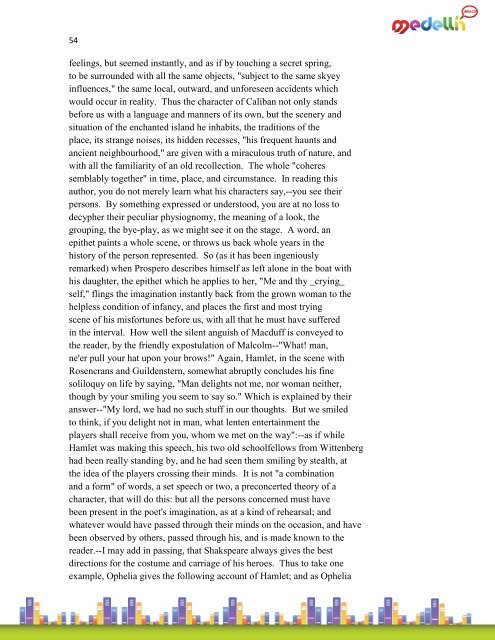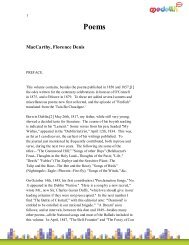Lectures On The English Poets William Hazlitt
Lectures On The English Poets William Hazlitt
Lectures On The English Poets William Hazlitt
Create successful ePaper yourself
Turn your PDF publications into a flip-book with our unique Google optimized e-Paper software.
54<br />
feelings, but seemed instantly, and as if by touching a secret spring,<br />
to be surrounded with all the same objects, "subject to the same skyey<br />
influences," the same local, outward, and unforeseen accidents which<br />
would occur in reality. Thus the character of Caliban not only stands<br />
before us with a language and manners of its own, but the scenery and<br />
situation of the enchanted island he inhabits, the traditions of the<br />
place, its strange noises, its hidden recesses, "his frequent haunts and<br />
ancient neighbourhood," are given with a miraculous truth of nature, and<br />
with all the familiarity of an old recollection. <strong>The</strong> whole "coheres<br />
semblably together" in time, place, and circumstance. In reading this<br />
author, you do not merely learn what his characters say,--you see their<br />
persons. By something expressed or understood, you are at no loss to<br />
decypher their peculiar physiognomy, the meaning of a look, the<br />
grouping, the bye-play, as we might see it on the stage. A word, an<br />
epithet paints a whole scene, or throws us back whole years in the<br />
history of the person represented. So (as it has been ingeniously<br />
remarked) when Prospero describes himself as left alone in the boat with<br />
his daughter, the epithet which he applies to her, "Me and thy _crying_<br />
self," flings the imagination instantly back from the grown woman to the<br />
helpless condition of infancy, and places the first and most trying<br />
scene of his misfortunes before us, with all that he must have suffered<br />
in the interval. How well the silent anguish of Macduff is conveyed to<br />
the reader, by the friendly expostulation of Malcolm--"What! man,<br />
ne'er pull your hat upon your brows!" Again, Hamlet, in the scene with<br />
Rosencrans and Guildenstern, somewhat abruptly concludes his fine<br />
soliloquy on life by saying, "Man delights not me, nor woman neither,<br />
though by your smiling you seem to say so." Which is explained by their<br />
answer--"My lord, we had no such stuff in our thoughts. But we smiled<br />
to think, if you delight not in man, what lenten entertainment the<br />
players shall receive from you, whom we met on the way":--as if while<br />
Hamlet was making this speech, his two old schoolfellows from Wittenberg<br />
had been really standing by, and he had seen them smiling by stealth, at<br />
the idea of the players crossing their minds. It is not "a combination<br />
and a form" of words, a set speech or two, a preconcerted theory of a<br />
character, that will do this: but all the persons concerned must have<br />
been present in the poet's imagination, as at a kind of rehearsal; and<br />
whatever would have passed through their minds on the occasion, and have<br />
been observed by others, passed through his, and is made known to the<br />
reader.--I may add in passing, that Shakspeare always gives the best<br />
directions for the costume and carriage of his heroes. Thus to take one<br />
example, Ophelia gives the following account of Hamlet; and as Ophelia

















